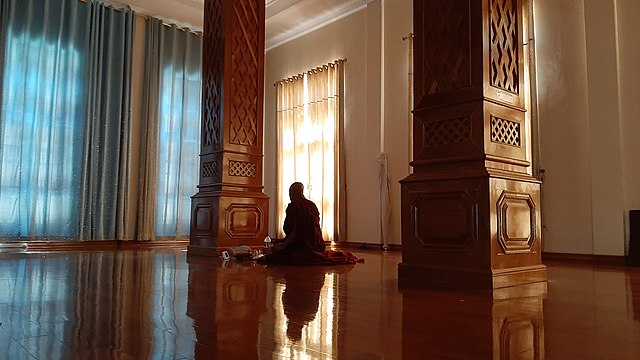TWH – Breathwork is an integral part of many Pagan traditions. Careful controlled breathing is used to focus awareness and center individuals during rituals and it is common to see breathwork practice and training on any festival schedule. Faery Seership as taught by Orion Foxwood is one such tradition that uses breath as an integral part of its practice. Two new scientific studies have documented the benefits of breathwork as a practice.
The neurobiology of breathing has been extensively studied, after all, everyone learns very quickly how to breathe at birth. But there has been relatively little comparative research or overviews on the efficacy and effectiveness of breathing techniques.
Outside of Pagan festivals and ritual spaces, many individuals are introduced to breathwork through yoga and yogic breathing techniques. Yogic breathing, or pranayama, is a series of breathing exercises that are used in yoga to control the breath and promote relaxation.
There are many different types of yogic breathing practices, but they all involve deep, controlled breaths that are meant to slow down the heart rate and calm the mind. Deep breathing is the most common of such techniques. It is simply careful attention to deep and slow breathing through the nose. Nostril breathing is similar but the breath is drawn through the nose one nostril at a time.

Taking a Deep Breath
But not all techniques are immediately calming. The Breath of Fire method is more vigorous. This yogic breathing technique is to stimulate the nervous system. The technique involves sitting in a comfortable position with hands on the knees, palms down followed by short rapid breath bursts through the nose.
In a study published in February in Scientific Reports, research published by a team of investigators in the UK and Spain gathered data from breathwork studies published in the last decade to summarize the benefits of breathwork on stress and mental health. They only looked at randomized scientific trials.
Their research found that controlled breathing techniques appear to help reduce anxiety, depression, and stress. Breathwork also appears to improve an overall sense of well-being. The researchers wrote that “People with stress and anxiety disorders tend to chronically breathe faster and more erratically, yet with increased meditation practice, respiration rate can become gradually slower, potentially translating into better health and mood, along with less autonomic activity.”
The researchers hypothesize that breathwork might not only lower nervous system excitation but also bring about a release of endorphins, neurotransmitters that are released by the brain that act as natural painkillers and can also produce feelings of euphoria.
However, what all breathwork methods have in common, whether they originate from yoga or other traditions, is that they are often incorporated into meditative techniques, a possible confounding element in the findings.
In another study, published in Cell Reports Medicine published last month, investigators in the Department of Neurobiology and Psychiatry and behavioral sciences at Stanford University set out to answer the question of whether breathwork or meditation was producing a beneficial effect on stress reduction and mood. In this study, the researchers sought to compare mindfulness meditation’s psychological and physiological effects to the effects observed by the practice of breathing exercises.
The researchers noted that “Yogic breathing practices reported increased feelings of peacefulness, improved reaction time and problem solving, decreased anxiety, and reduction of mind wandering and intrusive thoughts.” So, the researchers compared three different breathing techniques to mindfulness meditation with 108 participants randomly assigned to different techniques.

Senior Monk in Meditation, Myanmar [Photo Credit: Bks07 CC BY-SA 4.0]
These three techniques were “Sighing,” characterized by deep breaths followed by extended, relatively longer exhales, which has been associated with psychological relief, shifts in autonomic states, and resetting of respiratory rate; “Box breathing” is characterized by equal inhale and hold and exhale ratios and has been used by members of the military for stress regulation and performance improvement; and “Hyperventilation with retention,” characterized by an emphasis on inhalations of longer duration and relatively greater intensity than exhales.
The researchers found that “Both mindfulness meditation and breathwork groups showed significant reductions in state anxiety and negative affect and increases in positive affect.”
But cyclic sighing turned out to be more effective in promoting a positive mood than mindfulness meditation. The findings suggest that breathwork techniques might even be superior to mindfulness meditation in combatting anxiety and overcoming depressed mood.
The researchers were not certain of all the pathways by which cyclic breathing produces its effect. They wrote “Slowing down the breathing rhythm with sighs can signal higher-order brain structures associated with behavioral arousal and promote a sense of calm….[but] More research into how breathing influences brain networks involved in emotional regulation and influence mood is needed in humans.”
The studies are important not only because they find that intentional breathwork techniques can mitigate anxiety and stress but also because the practice of these techniques can be easily taught and mastered, as many in the Pagan have known.
The Wild Hunt is not responsible for links to external content.
To join a conversation on this post:
Visit our The Wild Hunt subreddit! Point your favorite browser to https://www.reddit.com/r/The_Wild_Hunt_News/, then click “JOIN”. Make sure to click the bell, too, to be notified of new articles posted to our subreddit.
